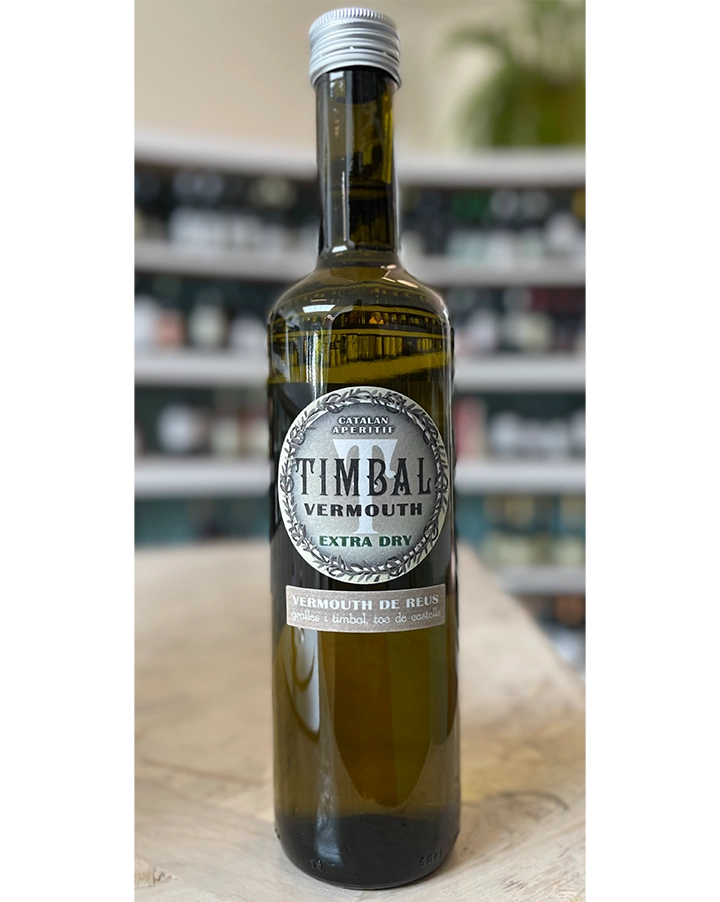Timbal Vermouth de Reus Extra Dry
Timbal Vermouth de Reus Extra Dry
500ml bottle
17% abv
- Made with botanicals familiar from olives
- Exceptional in the classic Martini
- Truly dry — no added sugar
- Producer is from historic center of vermouth production in Spain
This vermouth has a distinctly Catalan character, and embodies many of the savory flavors found in the famed olives of the region. Truly dry—with no added sugar—it is made with herbs sourced from the Pyrenees mountains and citrus of the Mediterranean. Its wine base of Airén (La Mancha) and Macabeo (Penedes) adds a nice minerality. Enjoy neat, with a splash of tonic, or in a 1:1 Martini. The town of Reus (near Tarragona in Catalonia) is the historic epicenter for vermouth production in Spain, where for over a century the producer Miró has set the benchmark for its wormwood-forward style.
The olive-herb notes of Timbal Extra Dry come out beautifully when mixed and chilled. Add tonic and a slice of orange for a low-alcohol take on the classic Barcelona gin-tonic. Mix 1:1 with Hayman's London Dry Gin for a briny Martini—no orange bitters or olive juice required! Combine with Bonal for an intensely mineral, mouth-filling aperitif.
The roots of Vermut de Reus extend to 1858, when Reus was the center of the Catalan wine trade. Producers from Penedes, Priorat and Terra Alta would bring their wines and brandies to Reus to sell, and by 1900 the expression “Paris, London and Reus” denoted the epicenters of the contemporary wine trade. Reus became a center of vermouth production to rival that of Torino and Chambéry, and prior to the outset of the Spanish Civil War, there were some 30 firms producing vermut in Reus alone. The house of Emilio Miró is one of the few survivors of this age and today is the most prominent remaining producer of Vermut de Reus. The tradition of La Hora del Vermut is once again a late afternoon fixture throughout Spain, especially in Catalunya, and the sweet red (rojo) variety is found in nearly every café and vermuteria—on ice, with olives and an orange slice (spritz optional). Meanwhile, bartenders are discovering that the subdued sweetness of Timbal Vermouth shines in classic cocktail proportions as tastes run toward drier yet no less flavorful formulations.
Vermut de Reus: Birthplace of Antoni Gaudí, the provincial city of Reus lies an hour southwest along the Mediterranean coast from Barcelona, in Tarragona. A market hub, it rose to prominence when the phylloxera scourge struck France and demand for Catalan wine exploded. By 1900, the expression ‘Paris, London and Reus’ denoted the epicenters of the contemporary wine trade, and it was from these roots that Reus evolved to become a center of vermouth production to rival that of Torino and Chambéry. Prior to the outset of the Spanish Civil War, there were some thirty firms producing vermut in Reus alone. Today, Vermut de Reus is amidst a second renaissance, and the Spanish passion for la hora del vermut (‘vermouth hour’) shows no sign of abating. The wines retain a distinctly Catalan character, and can be made in either a primary or lightly oxidative style. While *seco* (extra dry) and *blanco* are produced, it is the *rojo* (sweet red)-style that is still the staple of patrons at every vermuteria.
Share

